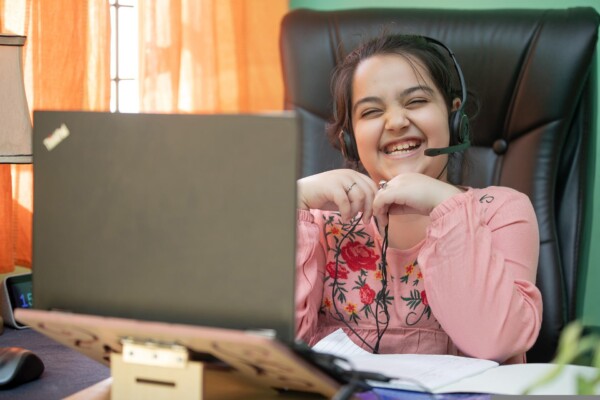
A young student seated at a computer desk with a laptop, wearing a headset and laughing (the person depicted is not the author’s sister)
To the visitor who enters my sister’s school, it is immediately clear that things are done a little differently here. Across the main entrance, a flock of walkers, wheelchairs and other devices awaits their owners, not unlike bikes in front of other schools. You might be approached by a curious student who, using a communication tablet, asks for your name. There is a room for snoezelen, and occupational therapy is on the timetable. In this special education school in Germany, about an hour by car from the Dutch border, students with complex physical and cognitive disabilities learn academic and life skills, receive therapies and socialize in an accessible environment. In addition to education for the students, the school provides orientation and support for parents and carers, not least by relieving them of their care and supervision duties during work hours. At least in ‘normal’ times.
January 2021. These are not ‘normal’ times, whatever that means. Like at every other school in Germany, students have to attend class from home. The lessons here are not like at most other schools though. They are more practical, more individual, more tangible – often literally. But you cannot touch something through a computer screen. Teachers run into a lot of barriers as they try to switch their classrooms to an online format. So do those who want to participate in them. Often, parents or carers sit next to students to help them operate laptops or tablets that are not adapted to their needs. Over the course of the pandemic, they feel more and more left alone and disappointed by policymakers who seem to lack the insight into their different school realities.
Inspired by such a disappointed rant by my mother, I decided to turn this school’s experience with Covid19-related policies into the topic of my bachelor thesis in Global Public Health at Leiden University College. In four interviews with teachers and a survey for parents and carers afterwards, I took a look at attendance in particular. For whom was it especially difficult to come to school? Why – which barriers were in the way? And what role did school play for these students and their families?
Of course, individual experiences varied a lot, and many families were hard to reach via surveys because of linguistic and other barriers. Still, I was able to learn a lot. These are my key takeaways:
Attendance has always been harder for disabled students – health is one factor, logistics (for example organizing a caretaking service for school) another. The pandemic made it even harder. Some students were nearly unreachable during lockdowns, others did not return to the physical classroom for long stretches of time. Distance learning was also done differently in different classes: many students were (video)called individually or received packages with learning material. Online classes took place too, but often only for a few hours per week.
There were four main barriers to attendance: student health, logistics, communication, and digital opportunities. Already disadvantaged families, who for example experienced poverty or spoke little German, faced more barriers than others, but individual student characteristics played a role as well. While some of these barriers include well-known problems, like the lack of a proper device for each child, some were more unique to this student group: many were (seen as) at high risk from Covid-19, communicating remotely was harder for some than for peers without disabilities, and even those who had access to digital devices could not always use them on their own. One particular logistic issue was therefore that many students needed help from a parent, carer or sibling during class. Already overwhelmed families, who now had to provide care and supervision 24/7 instead of receiving the usual support at school, could not always do this.
A key factor was that, compared to many other schools, this one filled several roles at once: educational facility, therapy center, daycare, social meeting point, provider of assistive technology and so on. Online classes could provide education and some social contact, but other important usual tasks could not be fulfilled. Many parents and carers found classes helpful for their children, but also a source of stress for themselves. Understandably so, in that the policies were made for mainstream schools which don’t usually provide these services – but unfortunate for families who depend on them.
Now, as we find ourselves in a less critical phase of the pandemic, it is time to evaluate and rewrite plans for the next wave, the next disease outbreak, and the next crisis in general. Disabled people, in this case students specifically, should not be an afterthought in these plans. Accessibility that only works under optimal circumstances is no accessibility at all – and crisis preparation needs to be for everyone.
Marieke Dohrmann, Leiden University College student